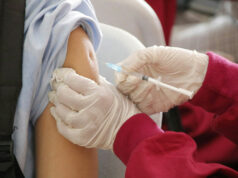Medicine Cabinet
Teodoro B. Padilla
(Second of two parts)
A SIGNATURE drive launched on Independence Day continues to gain ground with the hope of attaining a different kind of freedom for millions of men, women and children who may be suffering from a potentially catastrophic disease.
The campaign called “Kalayaan mula sa Kanser” or “Freedom from Cancer” aims to bring attention to the plight of individuals afflicted with the disease. The Cancer Coalition Philippines (CCPh) initiated the signature drive on change.org and various hospitals to tackle this growing and serious public health concern that hinders the country’s poverty reduction and development goals.
The advocacy is calling on Congress to pass laws that will widen efforts to manage and control cancer as well as increase investments for its prevention, early and accurate detection, diagnosis, and optimal treatment, survivorship follow-up, and rehabilitation.
The proposed integrated national cancer law is composed of the following components:
1. Strengthening of Cancer Care Infrastructure and Service Delivery Networks requires: a.) providing investments in health facility renovation or upgrade; b.) providing reliable supply of medicines, biologics, and other supplies; c.) training and enhancing oncology related capacities in pathology, radiotherapy, surgery, nursing care; d.) establishing clear protocols for patient navigation and palliative care; e.) ensuring proper recording and monitoring of cancer cases; and, f.) ensuring that recording and monitoring extends to primary health care units.
2. Strengthening the capacity of the Human Resources for Health in Cancer Care which refers to the creation of a curriculum for all health care workers providing cancer care treatment and support at all levels of the health care service delivery system.
3. Strengthening the FDA to ensure the safety, quality, and efficacy of medicines, biologics, and other health technologies means ensuring the availability of safe, efficacious quality medicines, biologics, and other health technologies for cancer patients. The agency shall also develop policies facilitating clinical trials, supporting early access to innovative therapies and health technologies to ensure highest possible fighting chance of survival among people with cancer.
4. Institutionalizing Funding and Social Protection Mechanisms for Cancer Patients, Survivors, Caregivers, and their Families is related to the provision of financial support for cancer patients, survivors, caregivers, and their families through the establishment of: a.) a cancer assistance fund; b.) PhilHealth Benefit Packages; and, c.) social protection mechanisms. Access to health care services should be provided without discrimination.
5. Establishment of a National Cancer Registry and Surveillance System and Evidence Generation for policy and decision making.
6. National and regional research and demonstration projects shall be conducted to generate evidence to improve policies and the implementation of the Integrated Philippine Cancer Control and Management Program (IPCCMP).
7. Strengthening Health Promotion, Information, and Education Programs. Health promotion and education activities shall be strengthened in schools and learning institutions, workplaces, communities, and among vulnerable, at-risk, and disadvantaged populations.
8. Establishing National Cancer Screening Programs is needed in identifying cancer at the earliest possible stage so that treatment is less costly, cure is most likely, survival rates will increase, and health outcomes will become more positive.
With the passage of a comprehensive cancer law, there is hope that individuals afflicted with cancer and their families will be given a strong fighting chance to conquer the disease.
Medicine Cabinet is a column of the Pharmaceutical and Healthcare Association of the Philippines (PHAP), representing the research-based medicines and vaccines sector in the country. The author is the executive director of PHAP. E-mail the author at medicinecabinet@phap.org.ph.



